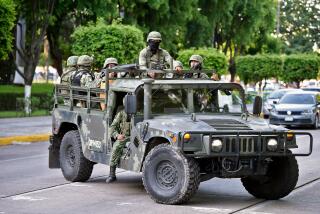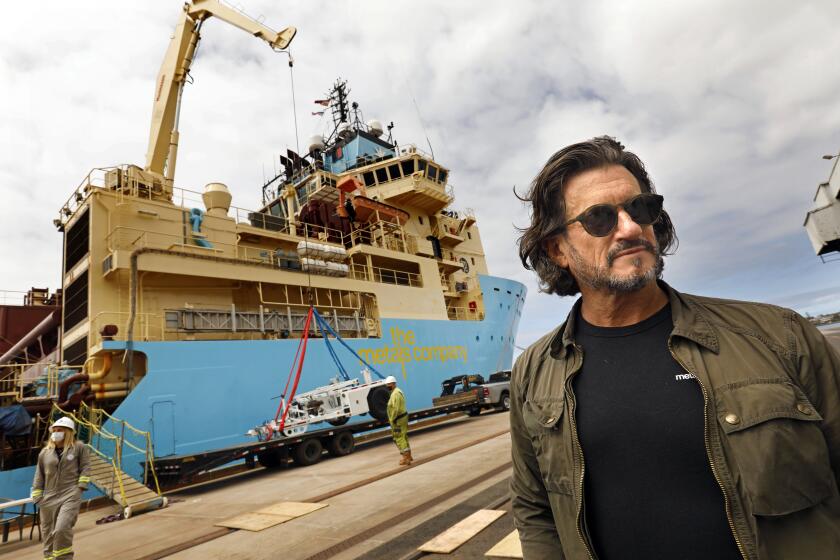Chile Prepares for Yes-or-No Vote That Could Send Pinochet Packing
On Oct. 5, Chileans confront a major decision--one that could open the way toward significant national progress in the 1990s, or plunge the country into a prolonged downturn. On that date, in a plebiscite mandated by the country’s 1980 constitution, voters will approve or reject the bid of Gen. Augusto Pinochet, who has ruled since 1973, to be president for eight more years.
The plebiscite was originally designed to legitimize Pinochet’s reign, but the Chilean opposition has decided to challenge the dictator’s authority while playing by his rules.
It is not clear whether Pinochet’s opponents will have the security and facilities required to campaign freely throughout the country. What is clear is that millions of Chileans of different perspectives want an opportunity to address the nation’s future. Almost 7.5 million people--some 90% of the potential electorate--have registered to vote, despite cumbersome and time-consuming procedures.
The Pinochet regime has considerable financial and tactical advantages in its campaign for a yes-vote, including pork-barreling, local patronage and the government’s virtual media monopoly--especially television. But the opposition is being given enough scope, including limited free TV access, to establish the plebiscite’s national and international legitimacy, barring massive fraud.
Most opposition leaders contend that the nation’s democratic political experience, the relevant legal provisions (including party observers at each polling station) and the glare of international publicity should assure a reasonably honest count. Few Chileans dismiss the plebiscite as a government-run charade.
Virtually all observers expect a close vote. A number of polls show the nays leading by a considerable margin in Santiago, the capital, with a very slight advantage in the country as a whole. But an unusual number of those interviewed--as many as 33% in some polls--say they are undecided or will not answer. No one can be sure whether this large bloc is genuinely ambivalent or simply wary of being recorded.
The race is tight enough to give both the government and the opposition every incentive to tailor their appeals to what the Chilean public wants: security, democracy, the protection of human rights and economic prosperity.
Considering how polarized Chile has been, the most striking thing about the current campaign is the similarity between the arguments advanced by the government and the opposition.
The authoritarian regime, having tarnished Chile’s democratic traditions for 15 years, has chosen now to affirm its commitment to democracy. Some of its television spots show the new Congress building under construction (Congress was shut down in 1973, when Pinochet led the overthrow of Salvador Allende’s socialist government), and all of them, in Orwellian fashion, call for “Democracia, Si.”
The opposition, for its part, has grudgingly had to acknowledge that the Chilean economy is not doing badly, and to reassure the private sector and the broad public that private property will be respected in a post-Pinochet Chile. The opposition has also had to send signals (albeit vague and inconclusive) that there will not be wholesale prosecution of military officers for human-rights violations, and has played down the personal charisma of its leaders. Architects of the opposition campaign understand that Chileans are uncertain about what a triumph of the nays will bring; they are trying, therefore, to present a moderate and consensual program.
One way or another, the plebiscite is bound to change the Chilean equation fundamentally. The regime’s ingenious constitutional engineering could boomerang, for the massive political energy mobilized by the plebiscite will not disappear the day after the vote; it will be a national reality, shaping the next stage of Chile’s history.
Regardless of plebiscite results, further negotiations are likely. The key issue will be whether and how the 1980 constitution can be modified; that document presupposes a continuing authoritarian regime, with Pinochet staying on as army chief for eight years and as senator for life, and with the military-dominated National Security Council playing a powerful political role. Important questions include how the armed forces hierarchy will be treated; what parties will be permitted to compete in Chilean electoral politics, and what socioeconomic program will be adopted.
Post-plebiscite bargaining will be shaped by the vote count and six other factors: Pinochet’s personal response to the vote; the opposition’s capacity to mobilize the public without terrifying the military and the business sector; the degree of agreement among the opposition on strategy and tactics; the extent of agreement among leaders of the Chilean armed forces; the political skill of the leading Chilean participants, and the influence of external actors.
If the no-vote wins a sweeping victory, there would be strong pressures to reduce or end Pinochet’s personal role and amend the constitution; the key questions then would be whether the opposition could remain united and resist the temptation to move so fast and so far as to trigger a counterreaction on the right and within the armed forces. If Pinochet is confirmed in a close vote, the regime may feel a need to make concessions--to gain acceptance of the results from the opposition and to reduce the appeal of those who will want to repudiate the plebiscite and turn to outright opposition or violence. Alternatively, Pinochet might move against his opponents; that would almost certainly produce major disruptions.
If, as seems most likely, the no-vote wins, but not by much, the opposition will have to recognize that a considerable number of Chileans prefer a prolonged military dictatorship to the uncertainty of a post-Pinochet regime. Moderates in the opposition will want to build a base for return to democracy by putting forward proposals acceptable to the military and other conservative sectors.
Within this context, external actors could be significant. Moscow will coach Chile’s Communist Party on the virtues of accommodation, gradualism and consensus in the transition process, but it remains to be seen how much clout Moscow still has in Santiago. Other Latin American nations, as well as countries of the European Community, will exert pressure for implementation of the plebiscite’s results.
The United States, which has also been pushing for a fair vote, may also be able to help, particularly if it can convince the armed forces and the business community to accept the plebiscite’s results, by assuring them that their interests can be adequately protected after Pinochet leaves office. U.S. credibility with these sectors has diminished in recent years, however, both because of human-rights policies perceived as hostile to Chile and because of Washington’s ineffectiveness at hard-line policies in Nicaragua, Panama and elsewhere.
The business community wants to protect Chile’s “silent revolution,” the transformation of the country’s economy that has brought growth with low inflation in recent years. Critics of the Chilean regime are quick to point out that this prosperity has mainly helped the upper-middle class; that income distribution remains badly skewed, and that changes in policy are needed to sustain economic performance and make its benefits more widely available.
As in the political realm, however, there is probably more basis for a national consensus in Chile today than at any time in the past generation. The business community recognizes the need to pay more attention to social and distributional issues, while the Chilean left has come to recognize a positive role for the private sector and to accept the legitimacy of private property and profit.
It is possible at long last to foresee a positive future in Chile. Although it would be foolish to make firm predictions, a combination of the successes and failures of Pinochet’s long-endured dictatorship could now facilitate a gradual transition to political democracy and increasing prosperity. After 15 years, the Chilean people deserve no less.
More to Read
Sign up for Essential California
The most important California stories and recommendations in your inbox every morning.
You may occasionally receive promotional content from the Los Angeles Times.





